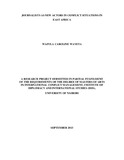| dc.description.abstract | Over the years, journalists have assumed a special importance in various conflicts the world
over. Their work is well defined and their key duty is to inform and educate the masses
through their various reports. It is a critical task in any society. This study looked into ways
in which journalists have become emerging participants in situations of conflict, as well as
the key players. This research therefore intended to examine and determine the place of
African journalists as actors in conflict situations and determine the role they play in peacebuilding
efforts. It intended to examine their various roles both negatively and positively and
determine whether they were accomplices or innocent in the same. The overall objective of
this study was to explore and establish the relationship between journalism and conflict
management. Specific objectives of the research were to: Identify specific actions that should
be taken to bring journalists on board in conflict management processes, determine whether
conflict managers need to acknowledge journalists as key actors in conflicts and find out
ways that journalists can be empowered to understand their role in conflict management. This
study used secondary source of data and the research design that was employed as a content
analysis. The target population in this research were conflict managers in regional and subregional
organisations; Policy makers in conflict management in regional and sub-regional
organisations; conflict management lecturers; journalism professional bodies in Africa and
journalists training bodies. The researcher also targeted journalists in the leading mainstream
local and international media-namely: Nation Media Group-Print and Broadcast; The
Standard Group- Print and Broadcast; Capital Group- Broadcast; Citizen Group- Broadcast;
British Broadcasting Group- Broadcast and Associated Press. To meet objectives of this
study, both quantitative and qualitative data was collected. The unit of analysis for this study
was the news and feature stories, advertisements, cartoons, opinions and commentaries that
covered the conflict resolution process. Data was analysed using Statistical Packages for
Social Sciences (SPSS) edition 18.0 and Microsoft Office Excel 2007. The study concludes
that journalists are role players in conflict situations because the way they reported
contributed to the escalation or reduction of conflict; they reported on conflict situations in
East Africa; they also contained conflict situations by reporting objectively without taking
sides with the conflicting parties and the way they report influence how conflicts take shape.
Journalists’ reports also expose causes of conflict. The study also concludes that journalists
qualify as actors in conflicts as stakeholders attempted to reach out to journalists in attempt to
deal with conflicts. The study recommends that top media managers should be trained on
how to control content that may spur local conflicts. The study also recommends that
journalism schools, as in the case of the East African region, should be urged to train
reporters based on relevant material such as books, experiences and even archaic theories
because this would help a great deal if journalist don’t separate the subject of peace in their
training. Further, as agenda setters and watchdogs, journalists should stop focusing on
conflicts as sources of stories and focus more on conflict resolution which is greatly
beneficial to the society. Further, conflict management should also involve a concept of
conflict journalism which can go a long way to help in conflict resolution by addressing root
causes of conflicts. This way, Journalism can effectively play its role in Conflict
Management. | en |

